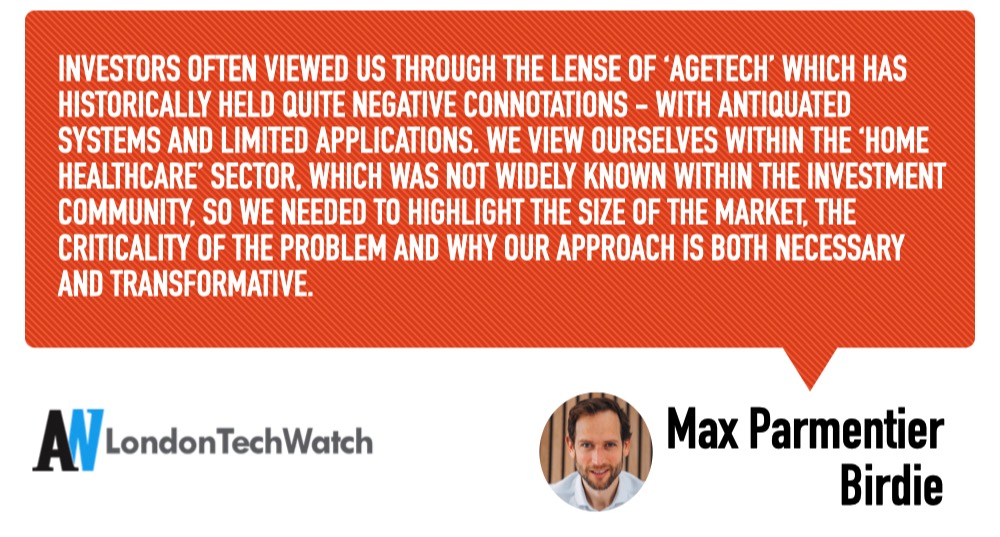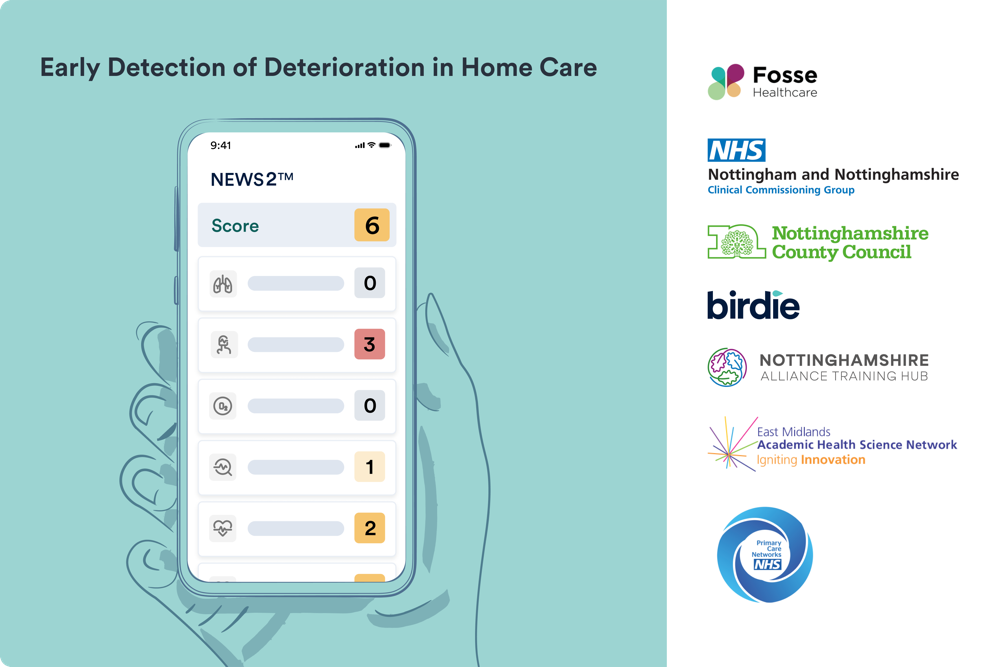The caregiver turnover rate was an astounding 65.2% in 2021. The number one reason cited for the high turnover is lack of communication along with concerns about disorganization within agencies. Birdie is an all-in-one platform for home healthcare providers to manage their businesses from care management to operations. By digitizing and streamlining the workflow, care providers are able to focus on providing excellent care without being bogged down by the administrative burden. Birdie takes care of the clinical aspect by allowing providers to develop care plans, the business aspect by handling billing and onboarding, compliance, and care coordination with other providers. The company estimates it saves its agency partners between 7-15 hours each week.
London TechWatch caught up with Birdie Cofounder and CEO Max Parmentier to learn more about the business, the company’s strategic plans, latest round of funding, which brings the total funding raised to $52.6M, and much, much more…
Who were your investors and how much did you raise?
We’ve just announced a $30M Series B raise which was led by investment firm Sofina and supported by OMERS Ventures and Index Ventures. This latest raise has taken our total investment to $52 million as we look to expand internationally and help millions live longer at home.
Tell us about your product or service.
Birdie is a home healthcare tech platform that is removing many of the administrative processes to help the care community deliver more personalised care. Our all-in-one solution equips care providers with the tools they need to do this, including mobile apps for both care professionals and family members, and a web app for home care providers. These not only enhance care planning and delivery by making care communities more efficient, but they also reduce the time spent on unnecessary tasks so they can ultimately focus on delivering the best quality care.
 What inspired the start of Birdie?
What inspired the start of Birdie?
Birdie was inspired by our founders collective experiences in the care industry. My grandfather suffered from Parkinson’s and we had to make the difficult decision to place him in a care home at the age of 78. He was unhappy from the start and sadly died not long after. Had he been at home, getting the care he needed, things might have been different and it made me want to help other people, just like my granddad, live longer, healthier lives in their own homes. We all believed technology was the answer and that’s why we started Birdie. We now work with 700 care businesses and deliver millions of visits every month.
How is it different?
There are a number of legacy SaaS providers in the care sector that focus on different elements of the care process, from assessment to operations management, however, the industry is ultimately fragmented. We differentiate ourselves by providing an all-in-one solution that encompasses the entire care business – delivering user-centric products, accompanied by a high-touch service approach, and placing our partners at the heart of everything we do. This unique relationship with our partners allows us to provide integrated analytics and insights that highlight performance gaps, while helping streamline and digitise many of the existing processes.
What market are you targeting and how big is it?
Ultimately, our target market is the millions of people in Europe who currently receive, or could receive, care at home. Globally, there are 703 million people aged 65 or older, and this number is projected to reach 1.5 billion by 2050. While this is the market that will ultimately benefit from our innovations, our customers are care providers of all sizes that are currently working tirelessly to better support this aging population. Our hope is that through Birdie we can make the processes smoother, and the quality of care higher for everyone involved.
What’s your business model?
Our SaaS business model enables care assessment, care planning, and delivery for the care providers, helping them deliver personalised, preventative care at home
What are your post-COVID office plans?
As a team of over 100, we’re remote-friendly and have colleagues around the world in the +/- 3 hour UK time, as well as our London HQ.
What was the funding process like?
We feel fortunate to have investors who believe in the necessity of our social mission and how we are solving a global problem. The care sector is currently in crisis, with job vacancies and over half a million adults awaiting care as a result. Our investors recognised that we can provide a solution to this challenge, transform the industry and help millions more age safely in their own homes. We’re incredibly proud to have closed the round within just four weeks of pitching, because this mission resonated with so many.
What are the biggest challenges that you faced while raising capital?
Investors often viewed us through the lense of ‘AgeTech’ which has historically held quite negative connotations – with antiquated systems and limited applications. We view ourselves within the ‘home healthcare’ sector, which was not widely known within the investment community, so we needed to highlight the size of the market, the criticality of the problem, and why our approach is both necessary and transformative.
What factors about your business led your investors to write the check?
The home healthcare industry is ripe for innovation, we just needed to showcase why Birdie was the right company to lead this transformation. Our strong product-market fit and commercial success to date was part of this, with product demand increasing threefold in the last year alone, but our investors also recognised our team’s passion and commitment to our vision of transforming ageing. This goes beyond our current platform with an ongoing investment to improve the quality of care for the elderly across Europe.
What are the milestones you plan to achieve in the next six months?
We are constantly learning and adapting our platform to better serve our partners and will be looking closely at our existing platform to expand its breadth and capabilities as we grow, alongside building partnerships to advance our research on health economics and health-based models.
One example of this is the new version of our rostering tool designed to optimise fulfillment rate, which will drastically help reduce commute time and increase face-to-face interactions for caregivers and their care recipients.
In the next six months, we will also be focusing our efforts on growing across Europe. We’ve already signed new partners in Spain and are looking to advance conversations in Ireland, France and Germany, where we know the care sector is under increased pressure.
What advice can you offer companies in London that do not have a fresh injection of capital in the bank?
It’s important to look beyond growth and focus on a wider set of metrics that demonstrate how you balance growth with margin and runway. A healthy business is key to survival in today’s environment and you can’t just rely on one element to show success.
You also can’t overlook the need for a solid relationship with investors. Many are looking to really get to know the business and understand the challenges and opportunities you face. The absentee investor is a thing of the past, so take the time to invite them into the business.
What’s your favourite outdoor activity in London?
Mountain biking in the suburbs is definitely one of my favourite things to do in the summer.






